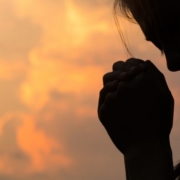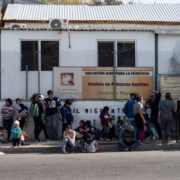Day 22: Laws and Liberation
BY JOHN GEHRING | March 18, 2020
Today’s Readings

As a kid, I lived under the sacred authoritarianism of Catholic sisters who commanded respect for the laws they set down for the local kingdom formally known as Immaculate Conception Elementary School. Some of their mandates, in my eleven-year-old wisdom, I deemed unjust laws: decrees that failed to respect our collective humanity as adolescents living in the Year of Our Lord, 1985.
One of these laws required strict silence as we entered the lunchroom in a single-file line, a practice that seemed perfectly suitable for the austerity of monks, but inconvenient for my seemingly benign habit of chatting with my friends. So it came to pass that on the first day after this decree went forth, I found myself in line with my best friend behind me. In a tasteful whisper, I turned to say hello. For this infraction, I found myself as an inaugural member at a lunchroom table reserved for lawbreakers. I munched my food silently for the next thirty minutes as fellow classmates enjoyed their peanut butter sandwiches, and the taunting liberty of casual conversation.

The readings today are about commandments and rules—heavy, freighted words that carry plenty of personal and societal baggage. It seems to be part of the human condition to chafe against what are perceived to be restrictions that confine our individuality. We often laud artists, thinkers and even spiritual teachers who are non-conformists, holy rebels and iconoclasts. While these readings can be challenging, I think that’s because we too often fail to see beyond the surface level. The essence of God’s laws and commandments are actually about helping us to live in freedom. But this freedom is a different kind of freedom than the radical individualism we venerate in our culture. We find authentic freedom as Christian disciples when we humble ourselves, renounce our own needs, and serve others in community. At the heart of all God’s commandments is love of neighbor, and justice is a requirement of love. “Justice is what love looks like in public,” Cornel West of Harvard University has written.
As we read today, Jesus came not to abolish the laws of his Jewish ancestors, but to fulfill the law. This fulfillment is the person of Jesus showing us how to live. The Incarnation puts literal flesh on the bones of the law. Jesus, in words and actions, teaches us a love-centered justice. God’s laws challenge us to personal conversion, but also to embody love, mercy, and justice in the systems and institutions. It’s not Christian to be kind to individual people only to accept realities where our immigrant neighbors, communities of color, LGBTQ people and others on the peripheries are excluded.
Building the kingdom of God in our lives, communities and public policies means bringing the margins to the center. Especially for those of us in historically privileged positions (straight white men), I believe that reflecting on the laws and commandments of God remind us that power can be used for the common good, or abused to indulge in the sins of racism, sexism, and homophobia. During this season of Lent and these uniquely challenging times in our world, let us discern in deeper ways how God is calling us to walk in the light of the law, and recognize how commandments rooted in mercy and justice can lead to personal and societal liberation.
John Gehring is Catholic program director at Faith in Public Life, and author of The Francis Effect: A Radical Pope’s Challenge to the American Catholic Church.









 Jesuit Refugee Service
Jesuit Refugee Service
I am still processing the overall message, but the phrase “sacred authoritarianism” at the start of your reflection captured me and took me back to my own Catholic grammar school days in the 1950s. Thank you.
Peace…John Leary
Recently I again thought about the personal discipline the sisters of yonder years taught us. Oh, how many times I have needed that skill. When I was on bedrest for two months before the births of our twins, when I had severe hip replacement and again on a no walking for six weeks, and now after having a stroke that damaged my right side. If not for that personal skill of discipline, where would I be?
One of my guidelines for young people was that you have to learn the rules before you can break them. I still maintain that idea. There are so many skills I have not learned to discipline myself .
Nice reflection. Thanks John Gehring. The explanation of laws in the day’s readings is plain and simple. We are invited to live our lives as human beings and not as robots. Respecting the dignity and rights of the other, are the little and tiny things we need to pay attention to, during our long or longer journey.
Justice is what love looks like in public – love this quote. So many of us our stuck in “its the law” – We forget that Love is bigger, broader and mor encompassing than the “law”. Thank you.
Thank you for this nice reflection which prompted a personal reflection of Catholic grade school days and those who gave their lives for the likes of all of us who attended those Catholic schools. It also was a refreshing review of the value of authentic freedom and, actually, what true freedom is. The secular world does not give us much of a chance to “know” this freedom you speak of. This makes me think of Bishop Robert Barron’s oft repeated words “Your life is not about you.” Thanks again.